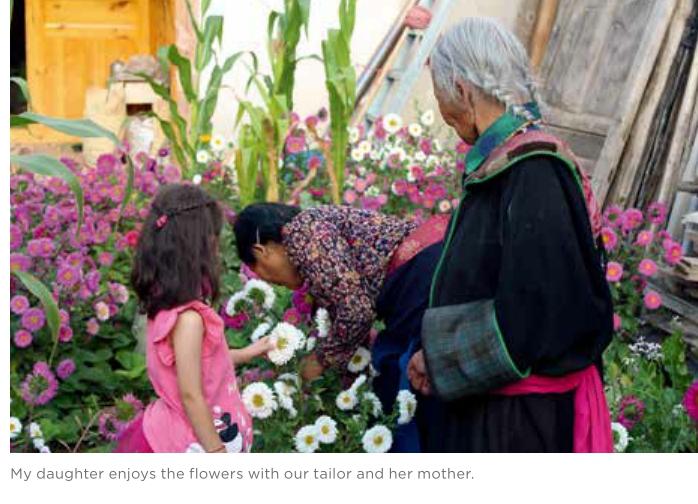The Story of Kim and Konchok
2020-04-14byKimberlyGaeth
by Kimberly Gaeth

China has a way of luring you back. After working for two years in northern China, I returned home to the United States to go to graduate school. I quickly started missing China and fantasized about going back. I was young and curious, and had an insatiable love for learning. I began to make plans to move back and eyed the western regions that were home to many of my former students. I told my parents all about the Tibetan students I taught during my first visit to China, highlighting their creativity, unique thinking and good looks. I told my mother that I might get lucky and find a smart, handsome Tibetan husband if I went back. I only made the remark to see her reaction—I really had no intention of settling down with anyone. Little did I know that I actually hit the nail on the head!
I returned to China in 2010 and chose Xining, capital city of Qinghai Province. It immediately felt good to be back. I worked, traveled, made some wonderful friends, and slowly became acquainted with many local cultures. Eventually, I was introduced to a nice, smart, handsome Tibetan man. The relationship with this man who I would later marry started not long after.
As with most cross-cultural relationships, ours began with naiveté about the difficulties we would later face. Our courtship was relaxing. We ventured out to explore the city. In doing so, we became more familiar with each others cultures and personalities. We found we had a lot of important things in common: We were both laid-back, peaceful people who loved to read, learn and explore. I felt very comfortable and safe with him. Even at the beginning of our relationship I suspected that we would eventually get married.
In Tibetan culture, parents learn little about their childrens romantic relationships until a wedding date is on the horizon. When the time comes, the adult children tend to ask for permission from their parents. Parents wield a veto power over any of their childrens relationships. Once the parents give consent, a formal proposal can be made. Traditionally, representatives from the young mans family take gifts to the young womans family. Because I am a foreigner, the engagement process was different for us.
Konchok told his parents about his intentions to marry me and was not met with a supportive response. His father warned him of the high divorce rate among Americans. His mother predicted that we would separate because I would miss my country and eventually want to go home. Although their reaction was far from encouraging, they didnt forbid him from marrying me, so we set a summer date.
If my own parents had any worries, they did not show. They supported me and my chosen partner and even found a way to visit China to attend our wedding. Not long after, we discovered we were expecting. During this time, I learned about local pregnancy and birth customs such as “sitting the month” (which thankfully seems slightly watered down in Tibet). I also learned about naming children and the family structure surrounding childcare.
Despite the challenges, my pregnancy was quite wonderful. Living with my Tibetan in-laws provides me unique access to holidays and events from an insiders perspective.
The most important holiday of the year for Tibetans, Losar(Tibetan New Year) is usually a festive and joyful event. We traveled back to his hometown, dressed up in colorful traditional clothes and enjoyed several days of activities such as bonfires, drum dances, and theater performances. The food was extra special and included numerous treats. Sometimes I got the opportunity to do things that other foreigners may miss such as freely enter Buddhist monasteries. I surely got a better view of events because I was sitting with local family or friends.
We have now been married seven years and have two children. Our marriage remains strong. We have both worked hard to understand each others personalities and cultures, and we do our best to make each other feel valued and loved. The longer I stay in China, the more I understand the benefits of some Tibetan practices that I previously disliked. Even when uncertainty surrounds us, our commitment to each other remains consistent and solid. We will continue to learn and grow together as we work for a brighter future.